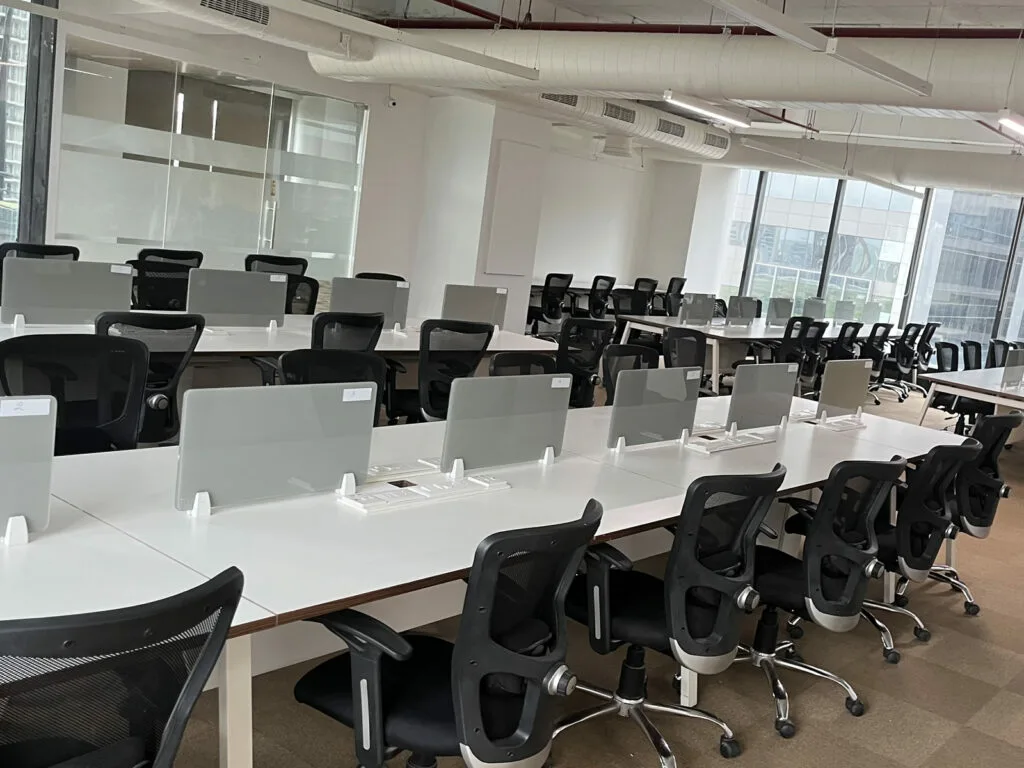
Coworking spaces have significantly reshaped the real estate market in recent years, offering flexible and collaborative environments for a wide range of professionals and businesses. Globally, these spaces are proliferating, though their development, adoption, and integration vary across major real estate markets. Valued at USD 13.29 billion in 2022, the coworking market is projected to grow at a compound annual growth rate (CAGR) of 14.9% from 2023 to 2030. This rapid growth is driven by advancements in technology and the expanding freelance economy, transforming how people work and interact. As competition among tenants intensifies, coworking models are emerging as cost-effective and flexible alternatives to traditional office spaces, influencing landlords, developers, and brokers.
In India, the demand for coworking spaces has surged, particularly in the post-pandemic period. Anarock’s latest data shows that coworking spaces accounted for 27% of net office absorption across the top seven cities in Q1 2023, up from 14% in Q1 2019. This reflects a growing preference for adaptable, cost-efficient workspaces as businesses prioritize flexibility. Net absorption of coworking spaces grew from 1.3 million sq-ft in Q1 2019 to 2.18 million sq-ft in Q1 2023, marking a 90% increase. This article explores how this trend varies across India’s key real estate markets, examining adoption rates and market dynamics in different cities and regions.
1. Bengaluru: The Epicenter of Coworking Growth
Bengaluru, often referred to as India’s Silicon Valley, remains the largest coworking hub in the country. The city accounted for a dominant share of coworking absorption in Q1 2023, along with NCR, together comprising 66% of net coworking absorption (approximately 1.43 million sq-ft).
- Demand Drivers: The city’s thriving tech ecosystem, startup culture, and presence of multinational corporations create a high demand for flexible office solutions. Startups and tech giants, who seek scalability and flexibility, drive the coworking trend in areas like Whitefield, Koramangala, and Outer Ring Road.
- Real Estate Impact: With 26% of the overall office absorption being from coworking players, Bengaluru’s coworking spaces are not only appealing to small and medium enterprises (SMEs) but also larger companies adopting hybrid work models.
- Work Culture: Coworking in Bengaluru thrives on networking and innovation, with a high emphasis on community events, hackathons, and startup accelerators.

2. NCR: Corporate Giants Turning to Coworking Spaces
The National Capital Region (NCR), encompassing Delhi, Gurgaon, and Noida, saw 32% of net office space absorption (approximately 0.61 million sq-ft) coming from coworking operators in Q1 2023. The shift towards coworking in NCR is driven by a mix of large corporations, small businesses, and freelancers.
- Demand Drivers: The influx of businesses seeking cost-effective office solutions amidst rising real estate costs in Gurgaon and Noida has spurred the growth of coworking spaces. The post-pandemic push for hybrid work models also accelerated this shift.
- Real Estate Impact: Premium coworking spaces are popular in business districts such as Cyber City in Gurgaon and Noida’s IT parks. These coworking hubs often boast advanced amenities like virtual offices, meeting rooms, and premium services to attract larger companies.
- Work Culture: With its proximity to government institutions and corporate headquarters, the NCR region’s coworking spaces have a more formal and corporate-centric vibe compared to Bengaluru’s innovation-driven culture.
3. Pune: Rising Star in the Western Markets
Pune, alongside Chennai, recorded 0.52 million sq-ft of coworking space absorption in Q1 2023. With its growing startup ecosystem and proximity to Mumbai, Pune is rapidly becoming a key player in India’s coworking market.
- Demand Drivers: The city’s strong educational infrastructure and expanding IT sector have attracted a large pool of tech talent and startups. Companies in Pune are looking for more cost-efficient and flexible office space solutions, fueling the demand for coworking spaces.
- Real Estate Impact: 24% of Pune’s net office absorption came from coworking operators in Q1 2023, making it an attractive market for flexible workspaces. Areas like Baner, Hinjawadi, and Kalyani Nagar are emerging as coworking hotspots.
- Work Culture: Pune’s coworking spaces blend professional and casual work environments, offering a collaborative atmosphere that appeals to young professionals and small businesses.

4. Hyderabad: Tech-Driven Expansion
Hyderabad, part of India’s key southern cities alongside Bengaluru and Chennai, saw 26% of its net office absorption (approximately 1.19 million sq-ft) in Q1 2023 attributed to coworking players.
- Demand Drivers: Known for its burgeoning IT sector and hosting tech giants like Microsoft, Google, and Amazon, Hyderabad’s demand for coworking spaces continues to grow. The city’s relatively lower real estate costs, compared to Bengaluru and NCR, make it an attractive alternative for both startups and large enterprises.
- Real Estate Impact: With a tech-heavy demand in areas like HITEC City and Gachibowli, Hyderabad’s coworking spaces focus on offering technologically advanced facilities, such as high-speed internet, cloud services, and secure data infrastructure.
- Work Culture: Similar to Bengaluru, the work culture in Hyderabad’s coworking spaces revolves around productivity and tech-driven innovation.
5. Chennai: Balanced Growth in the South
Chennai witnessed a stable coworking demand, contributing significantly to the southern markets’ office absorption figures. In Q1 2023, coworking spaces absorbed a large chunk of the 4.6 million sq-ft total net office absorption in Bengaluru, Hyderabad, and Chennai combined.
- Demand Drivers: Chennai’s industrial base, coupled with its expanding IT sector, has created a growing need for coworking spaces. Startups and SMEs in the manufacturing and tech sectors drive the demand for flexible workspaces.
- Real Estate Impact: With an increasing number of coworking spaces in areas like OMR (Old Mahabalipuram Road) and Guindy, the city’s real estate market is evolving to accommodate the growing demand for shared office spaces.
- Work Culture: Work culture in Chennai’s coworking spaces strikes a balance between corporate professionalism and collaborative environments, catering to both SMEs and large organizations.
6. Western Markets: Mumbai and Pune
The western markets of Mumbai Metropolitan Region (MMR) and Pune together saw 1.48 million sq-ft of net office space absorption, with 24% of this (0.35 million sq-ft) absorbed by coworking operators in Q1 2023.

- Demand Drivers: Mumbai’s high real estate prices push businesses to seek flexible and cost-effective coworking solutions. The presence of financial institutions, media houses, and startups creates a varied demand for coworking spaces.
- Real Estate Impact: Areas like Bandra-Kurla Complex (BKC) and Andheri have seen a surge in coworking hubs that offer premium services to cater to the city’s high-end clientele. In contrast, Navi Mumbai offers more affordable coworking options for smaller businesses and startups.
- Work Culture: Mumbai’s coworking spaces are fast-paced and business-oriented, offering everything from luxury meeting rooms to podcast studios for creative professionals.
7. Kolkata: Slow but Steady
Kolkata recorded 0.25 million sq-ft of net office absorption, with only 12% (0.03 million sq-ft) being from coworking players in Q1 2023. Although the city’s coworking demand is modest compared to other metros, it is gradually picking up pace.
- Demand Drivers: Kolkata’s coworking spaces cater primarily to startups, freelancers, and SMEs. The city’s slow but steady economic growth has seen increased demand for affordable coworking options.
- Real Estate Impact: Compared to other metro cities, Kolkata’s real estate market is more affordable, and coworking spaces here are typically smaller in scale. The market, however, is growing, with more shared offices opening in areas like Salt Lake and New Town.
- Work Culture: Kolkata’s coworking spaces are community-driven, with a focus on local startups and small businesses seeking cost-effective and flexible office solutions.
Conclusion
The rise of coworking spaces across India’s major real estate markets underscores the increasing demand for flexible, scalable office solutions that cater to diverse business needs, from startups to large corporations. Cities like Bengaluru, NCR, and Pune have developed distinct coworking ecosystems, driven by local demand dynamics and industry requirements. As real estate prices escalate and hybrid work models gain prominence, coworking spaces will continue to play a significant role in shaping India’s office landscape. With Anarock data showing a 90% growth in coworking demand over the past four years, the future for this sector in Indian real estate appears highly promising.
About Author
Aryan Suri is a dynamic real estate expert with extensive experience in commercial investment, asset management, and business development. He excels in managing sales, marketing, and operations, developing strategies that enhance efficiency and align with high-level business goals. As an entrepreneurial leader, Aryan drives cross-functional collaboration and focuses on building strong relationships. He specializes in creating customized real estate solutions to help clients achieve their investment objectives and effectively grow their portfolios.

